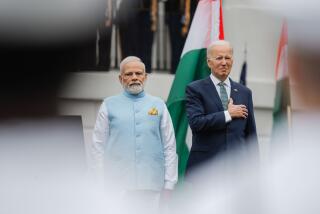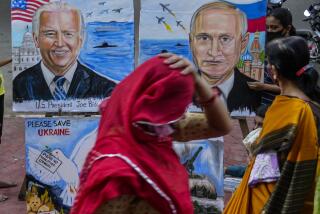Poverty Should Be a Shared Basis for Progress at Taj Mahal Summit
- Share via
This weekend, an extraordinary summit will take place in the shadows of Moghul grandeur as Indian Prime Minister Atal Behari Vajpayee and Pakistan’s new president, Gen. Pervez Musharraf, meet at the Taj Mahal. The Agra summit will be a rare opportunity for two men who publicly lectured each other about democracy and terrorism 18 months ago to demonstrate political maturity in addressing their myriad problems.
The dispute over Kashmir, a region that has thrice driven these two nuclear-capable nations to war, will ostensibly take center stage. But taking on the most vexing problem that unrestrained militarism has sown in South Asia--abject poverty--will define the real agenda at Agra. Let’s examine the situation facing both countries.
India needs inexpensive natural gas from Iran to fuel its burgeoning energy needs. An overland pipeline carrying Iranian gas through Pakistan at one-third the cost of both surface and underwater ocean routes is the optimal solution. But Vajpayee cannot easily take the risk that comes from paying transit fees to Pakistan’s military regime, money that might be used to finance Kashmiri resistance fighters to kill Indian soldiers. Soldiers coming home in body bags from Kargil in 1999 forced his government from office once before.
Pakistan needs the money to avoid bankruptcy. Up to $700 million a year from transit fees coupled with the removal of U.S. economic sanctions and the resumption of full-scale International Monetary Fund relief are hefty incentives to improve neighborly relations. Oil and gas refineries providing cheap products to the Indian marketplace would transform a nation on the path of radicalization into the transit and distribution hub for Central Asian energy reserves. Musharraf has publicly guaranteed the security of any gas pipeline that would pass through Pakistan. During the summit, he should privately assure Vajpayee that the days of Islamabad’s unqualified military and financial support for overzealous militancy and violence in the Kashmir Valley are over. The Indian leader should respond by agreeing to reduce significantly the huge number of security personnel there.
Also hidden behind Vajpayee’s bravado in asking Musharraf to fly to India is a complex web of geostrategic considerations born in the power corridors of Washington. The timing of the Musharraf invitation is not accidental. In return for a U.S. pledge to subtly elevate India’s stature on the world stage, New Delhi bought into the Bush administration’s vision for a strategic missile defense shield--hook, line and sinker--with one caveat.
Vajpayee would have to find a way to resolve differences in his own neighborhood that could become distractions from the U.S. business of counterbalancing and containing China. And so an invitation to Musharraf, the man Vajpayee once held responsible for the fall of his government and the “theft” of Indian land at Kargil, was born out of economic necessities at home buttressed by strategic considerations abroad. But for the summit to achieve anything more than atmospherics, these two antagonists must make bold proposals for peace that only their hard-liner status can sell at home. They should start in Kashmir.
The dispute over the Siachen Glacier, a remote area in Kashmir where each country has deployed innumerable troops and spent countless billions in maintaining a futile presence, was theoretically resolved in 1989, but the agreement was never signed or implemented. Both men should sign it and implement it. Then they should earmark the peace dividends that $1.5 billion in annual reduced military spending would bring for domestic social and economic welfare programs.
Both nations should agree to a framework for the long-term resolution of the Himalayan conflict that includes Kashmiris on both sides of the Line of Control as full partners for peace rather than pawns in South Asia’s nuclear chess match. There is no more tragic pre-summit result than the canceling of India’s unilateral cease-fire in May, just as the Musharraf invitation was being readied. For 18 months prior to that, New Delhi had vigorously sought rapprochement with the Kashmiris.
For Musharraf, the stakes are no less than the survival of a nation. Failure would certainly usher in an era of rule by radicalized Muslim zealots. Vajpayee will never again have the chance to make peace with a man so committed to changing Pakistan’s failed ways.
More to Read
Sign up for Essential California
The most important California stories and recommendations in your inbox every morning.
You may occasionally receive promotional content from the Los Angeles Times.













